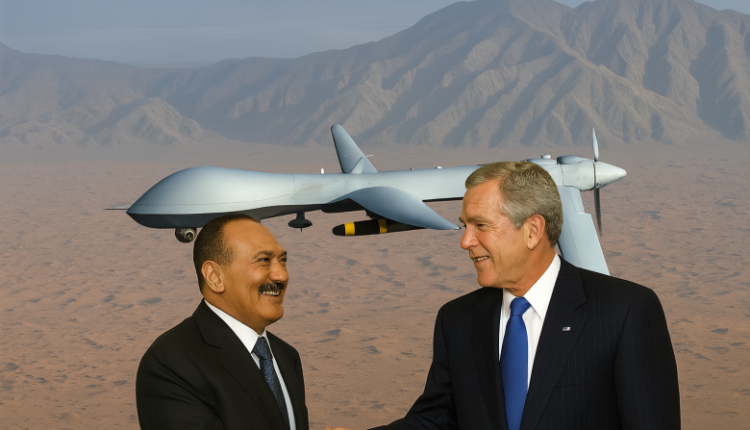The “Afashi Era”… Years of Subservience and Shameful Submission to American Domination Over Yemen’s Sovereignty
The Afashi era is not just a chapter in Yemen’s history—it is a dark record of betrayal and dependency. The deceased dictator Ali Abdullah Saleh handed the state to the United States on a silver platter, opening the doors of security, politics, and intelligence wide to Washington. He turned Yemen into an open playground for foreign intervention, while national decision-making became nothing more than a worthless façade. Every institution—from the army to intelligence services—succumbed to foreign dictates and became tools for implementing the American agenda at the expense of the Yemeni people.
This failure wasn’t limited to political or military administration; it seeped into every aspect of national life, leaving Yemen stripped of its sovereignty and fully exposed to American influence. The Afashi era was not a form of governance—it was complete surrender, a disfigured national will, and devastated sovereignty, allowing foreign powers to control Yemen’s land, institutions, and decisions without oversight. It produced chapters of foreign exploitation unprecedented in recent decades.
From Cooperation to Total Exploitation: The Era of Afashi Subservience
The Afashi era was not merely weak governance—it was a deliberate project to bend the state to American influence. The regime used every state institution as an entry point for foreign control. This was most evident in the agreements signed under glossy labels like “strategic cooperation” and “security partnership,” especially the counterterrorism cooperation agreement. Marketed as a step toward national security, the agreement was, in reality, the most dangerous door through which American agencies secured unrestricted access to operate inside Yemen—marking the beginning of full-scale exploitation.
What was presented as cooperation quickly turned into a cover for wide-ranging U.S. operations inside Yemen. These included mass arrests of hundreds of Yemenis—among them political and religious figures—closures of newspapers, and the silencing of media voices under the label of “extremism,” alongside hundreds of American airstrikes that killed civilians across various regions. These events exposed the fact that the state no longer controlled its own airspace and that the so-called partnership was nothing but a ladder for American domination.
Simultaneously, Yemeni security and intelligence agencies became extensions of U.S. authority, opening their doors to foreign advisors who effectively shaped strategies and monitored operations. “Joint operations rooms” were, in practice, run by American experts, while Yemen’s role shrank to mere execution of orders. Political and economic agreements reinforced this dependency, making every form of support conditional on foreign interests.
The most dangerous link in this chain was the U.S. training and armament program for the Yemeni army—publicly promoted as a modernization effort but, in reality, a calculated plan to neutralize Yemen’s defense capabilities. Under American supervision, hundreds of missile systems—especially air-defense units—were destroyed in controlled demolitions attended by top Afashi-era military figures, including Saleh’s own nephew. As a result, the Yemeni army became a hollow institution, incapable of defending the nation and exposed to any foreign intrusion.
Thus, the Afashi era became a fully integrated system of surrender, where every agreement and every “coordination effort” was another link in a chain designed to reduce the ruler to a local representative of American hegemony, with national decisions dependent on foreign advisers under the pretext of “cooperation.”
The Consequences of Afashi Subservience on the Yemeni State
The effects of this subservience were glaring across state institutions. No entity remained capable of making independent decisions, whether in administration or internal policy. Even agreements framed as pathways for reform—like the counterterrorism agreement and the military training program—revealed their true nature once implemented: instead of strengthening the state, they deepened its fragility and increased its dependency.
American operations inside Yemen—arrests, media suppression, airstrikes—were all conducted under the umbrella of these agreements, demonstrating that Yemen’s security decisions no longer rested in national hands. Security agencies operated according to American intelligence and directives, reducing their sovereign role to nothing more than preserving the outer shell of the state.
In the military sector, the consequences were even more devastating. The U.S. training program disarmed Yemen’s military strength by destroying air-defense systems, disabling the country’s ability to protect its skies, and giving American drones complete freedom to strike at will. Thus, the armed forces

